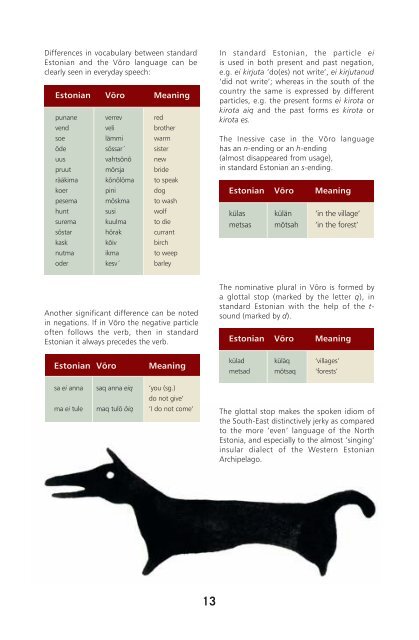You also want an ePaper? Increase the reach of your titles
YUMPU automatically turns print PDFs into web optimized ePapers that Google loves.
Differences in vocabulary between standard<br />
Estonian and the Võro language can be<br />
clearly seen in everyday speech:<br />
Estonian Võro Meaning<br />
punane verrev red<br />
vend veli brother<br />
soe lämmi warm<br />
õde sõssar´ sister<br />
uus vahtsõnõ new<br />
pruut mõrsja bride<br />
rääkima kõnõlõma to speak<br />
koer pini dog<br />
pesema mõskma to wash<br />
hunt susi wolf<br />
surema kuulma to die<br />
sõstar hõrak currant<br />
kask kõiv birch<br />
nutma ikma to weep<br />
oder kesv´ barley<br />
In standard Estonian, the particle ei<br />
is used in both present and past negation,<br />
e.g. ei kirjuta ‘do(es) not write’, ei kirjutanud<br />
‘did not write’; whereas in the south of the<br />
country the same is expressed by different<br />
particles, e.g. the present forms ei kirota or<br />
kirota aiq and the past forms es kirota or<br />
kirota es.<br />
The Inessive case in the Võro language<br />
has an n-ending or an h-ending<br />
(almost disappeared from usage),<br />
in standard Estonian an s-ending.<br />
Estonian Võro Meaning<br />
külas külän ‘in the village’<br />
metsas mõtsah ‘in the forest’<br />
Another significant difference can be noted<br />
in negations. If in Võro the negative particle<br />
often follows the verb, then in standard<br />
Estonian it always precedes the verb.<br />
The nominative plural in Võro is formed by<br />
a glottal stop (marked by the letter q), in<br />
standard Estonian with the help of the t-<br />
sound (marked by d).<br />
Estonian Võro Meaning<br />
Estonian Võro<br />
Meaning<br />
külad küläq ‘villages’<br />
metsad mõtsaq ‘forests’<br />
sa ei anna saq anna eiq ‘you (sg.)<br />
do not give’<br />
ma ei tule maq tulõ õiq ‘I do not come’<br />
The glottal stop makes the spoken idiom of<br />
the South-East distinctively jerky as compared<br />
to the more ‘even‘ language of the North<br />
Estonia, and especially to the almost ‘singing‘<br />
insular dialect of the Western Estonian<br />
Archipelago.<br />
13


